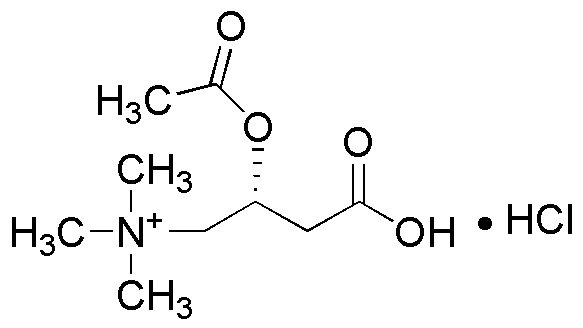Acetyl-L-carnitine chloride is widely utilized in research focused on:
- Neuroscience: It is often used in studies related to cognitive function and neuroprotection, helping researchers explore its potential in treating neurodegenerative diseases like Alzheimer’s.
- Metabolic Disorders: This compound plays a role in fat metabolism and energy production, making it valuable in research on obesity and metabolic syndrome.
- Sports Nutrition: Athletes and fitness professionals use it to enhance performance and recovery, as it may improve endurance and reduce muscle soreness.
- Pharmaceutical Development: It serves as a key ingredient in formulations aimed at improving mitochondrial function, which is crucial for developing treatments for various chronic diseases.
- Supplement Industry: Commonly found in dietary supplements, it is marketed for its potential benefits in boosting energy levels and improving mental clarity.
General Information
Properties
Safety and Regulations
Applications
Acetyl-L-carnitine chloride is widely utilized in research focused on:
- Neuroscience: It is often used in studies related to cognitive function and neuroprotection, helping researchers explore its potential in treating neurodegenerative diseases like Alzheimer’s.
- Metabolic Disorders: This compound plays a role in fat metabolism and energy production, making it valuable in research on obesity and metabolic syndrome.
- Sports Nutrition: Athletes and fitness professionals use it to enhance performance and recovery, as it may improve endurance and reduce muscle soreness.
- Pharmaceutical Development: It serves as a key ingredient in formulations aimed at improving mitochondrial function, which is crucial for developing treatments for various chronic diseases.
- Supplement Industry: Commonly found in dietary supplements, it is marketed for its potential benefits in boosting energy levels and improving mental clarity.
Documents
Safety Data Sheets (SDS)
The SDS provides comprehensive safety information on handling, storage, and disposal of the product.
Product Specification (PS)
The PS provides a comprehensive breakdown of the product’s properties, including chemical composition, physical state, purity, and storage requirements. It also details acceptable quality ranges and the product's intended applications.
Certificates of Analysis (COA)
Search for Certificates of Analysis (COA) by entering the products Lot Number. Lot and Batch Numbers can be found on a product’s label following the words ‘Lot’ or ‘Batch’.
*Catalog Number
*Lot Number
Certificates Of Origin (COO)
This COO confirms the country where the product was manufactured, and also details the materials and components used in it and whether it is derived from natural, synthetic, or other specific sources. This certificate may be required for customs, trade, and regulatory compliance.
*Catalog Number
*Lot Number
Safety Data Sheets (SDS)
The SDS provides comprehensive safety information on handling, storage, and disposal of the product.
DownloadProduct Specification (PS)
The PS provides a comprehensive breakdown of the product’s properties, including chemical composition, physical state, purity, and storage requirements. It also details acceptable quality ranges and the product's intended applications.
DownloadCertificates of Analysis (COA)
Search for Certificates of Analysis (COA) by entering the products Lot Number. Lot and Batch Numbers can be found on a product’s label following the words ‘Lot’ or ‘Batch’.
*Catalog Number
*Lot Number
Certificates Of Origin (COO)
This COO confirms the country where the product was manufactured, and also details the materials and components used in it and whether it is derived from natural, synthetic, or other specific sources. This certificate may be required for customs, trade, and regulatory compliance.


